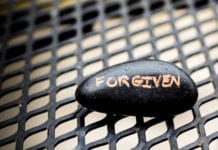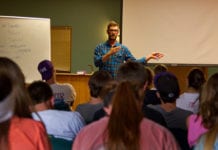Because there is a lot of talk about churches being missional and the need for missional community, there is a lot of talk about how to be a missional leader. In the previous post, I challenged the common approach to training leaders by giving them a list of habits that promises group growth when they are practiced. This is an leadership approach that is shaped by a mechanistic imagination, “If I do these things, I will be a good leader.”
As an alternative to this, it seems popular to shape an imagination about missional leadership around word pictures like “radical”, “leap of faith”, “rejection of the status quo”, “irreligious”, “subversion”, and the like. This is “hero” language. There seems to be a loud call for heroes of the faith to stand up and do wild things for Jesus. This use of words to shake up things and wake the church out of its slumber is challenging the mechanistic imagination, but is this hero imagination pointing us in the right direction?
This message is quite popular at this point in the journey of the American church. Many seem impressed by this approach. I’m not so much. I’ve been down that road. In the 1990s I worked for Ralph W. Neighbour Jr. He used very similar language to stir up the church. He challenged the status quo with a prophet’s clarion call that shook people into action. He called people to a different kind of church. He invited people into a new world of follow Jesus in radical ways. And it has had a huge impact … on some churches in North America. (Most of his lasting impact has been in South America, Africa, and Southeast Asia, but that’s another story. Here I want to focus on North America.)
Here’s my experience with this radical message: First of all, it was inspiring. In fact, it changed my life. I made some radical changes and took some huge leaps of faith. However, I am a radical person. I think in prophetic ways and I’m very innovative. In my experience, radical language works for someone like me, but not so much people who are much more consistent and don’t make huge changes quickly. In the same way, leaders in North America who responded well to Ralph Neighbour and have been able to carry forth his vision were wired in a way that would make it easier for them to be radical or heroic.
My second point builds upon this. The DISC personality profile has found that 69% of the population is an “S” which stands for “Steady.” They are consistent, faithful and diligent. They don’t make changes quickly. Instead they are thoughtful and considerate when it comes to change. They are not naturally the “hero” type. They don’t do “radical” or “wild” things. If that is the case, then does that mean that they cannot be leaders in the missional life that God wants?
And my third point is even more troublesome. Over the last two decades of working with radical challenges to the status quo in the church, I’ve found that many people who respond to this radical message and even want to bring it to fruition fail to do so. The problem is that they take on this radical hero language and try to implement it with the practices of a hero. Heroes will not carry out the vision of God’s mission in the world, but hero language sure does sell a lot of books and stir up a lot of hubbub in the church. Let me explain.
Heroic Practices has a deep tradition rooted in the ethics of Aristotle. Don’t worry, I’m not going to get too deep here. I just want to point out how Aristotle’s practices emphasized a kind of ideal life that would shape heros. Ethicist Samuel Wells has served me as a guide for identifying the practices of Aristotle’s hero. He’s the center of the story, a stand out above others, self-sufficient, courageous, disciplined, quick witted, quick in battle, and excellent at whatever he does. He does what normal people do not. He stands against the status quo and leaps into the fray in a way that others do not. He is “great.” But there is one more thing that marks a hero. His actions and choices turn out “right.” He wins. He succeeds. He is a hero.
Honestly, I am saddened by how much hero language is used to describe leadership and discipleship in the church. I’m even more saddened at how much I have used hero language. I’m troubled by how the hero imagination is shaping the conversation about what it means to lead a missional small group or a missional community. While I’ve not seen a list of “missional hero practices,” I’ve read enough blog posts and books to comprise a non-definitive list of practices that is shaped by this imagination. Missional community leaders practice the following:
- They lead people to “attack” a cause. For some reason, “having a common cause” seems to be the driving force for being missional. And while a common cause is helpful, it’s the imagination about “attacking” a cause that concerns me.
- They are risk-taking entrepreneurs who know how to venture into new areas. But most people are not like this. Therefore this cannot be a common practice that can be applied across the board to all missional leaders.
- They develop experimental structures.
- They are charismatic in that they are inspiring leaders. But again, if we allow this mark of heroic leadership to shape missional leadership then we are narrowing it to a few people.
- They rebel against tradition and anything that has been developed in the traditional church. The heroic imagination tends to emphasize the new and the next and discount the fact that God has been working in the world long before the hero arrived on the scene.
- They focus on the imitation of Christ. Now of course you might think “What’s wrong with that?” My response is “nothing” as long as it’s done with the mindset that you are imitating Christ’s dependance on the Holy Spirit. But the problem is that a heroic imagination causes people to focus on “being like Christ” in a photocopy kind of way, which of course no one can do. They tend to miss the reality that the Holy Spirit empowers in unique ways in the present context.
- They idealize the vision for the church. They point to some kind of ideal way of doing church, usually looking at the New Testament form of church life as something that serves as a goal to which all churches must return. This stimulates the prophetic voice, but it causes them to miss the reality that God is working now through weak, broken vessels just as he did in the first century.
We need innovative, risk takers. We need prophetic voices. We need people who will stir the pot. I hope so because I am one of those people. But we don’t need leaders who are shaped by the heroic imagination.
By contrast, we need leaders who are shaped by what the New Testament calls a “saint” imagination. We will introduce that in the next post.
[To see the previous posts in this series, click here]










